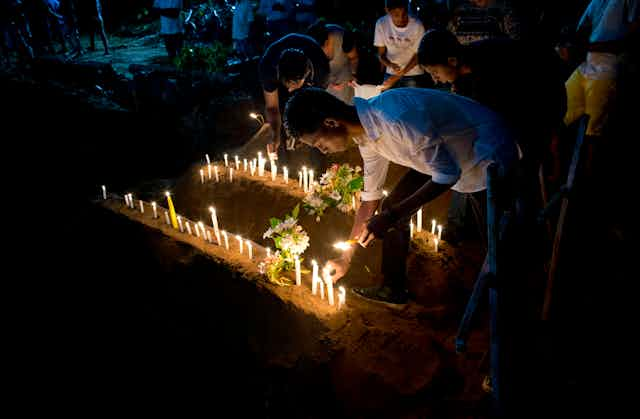Around the world, religious minorities are facing violence because of their beliefs.
Noting that attacks on places of worship had increased, this year the United Nations declared Aug. 22 as an International Day Commemorating the Victims of Acts of Violence Based on Religion and Belief.
Speaking on Aug. 22, 2019, UN Secretary General António Guterres said, “Jews have been murdered in synagogues, their gravestones defaced with swastikas; Muslims gunned down in mosques, their religious sites vandalized; Christians killed at prayer, their churches torched.”
The Conversation followed global events throughout 2019 to put the spotlight on how religious minorities were being targeted or driven from their homelands.
1. Persecution in China
Reports of religious suppression in China have been particularly troubling this year. Over a million Uighurs, a Muslim minority ethnic group, are being held in detention centers in Xinjiang region, in northwest China.

Anthropologist Darren Byler, who conducted research in the area between 2011 and 2018, writes that Chinese authorities have been using technology since 2016 to track Uighurs.
Chinese authorities, he notes, “began to collect biometric data, such as DNA, high-fidelity voice recordings and face scans, from the entire population of the region in order to track the activities of people on WeChat and in their daily lives using their voice signature and faceprint.”
For many Uighurs such online forums were a way to exchange “cultural knowledge, political events and economic opportunities.” However, as Byler explains, the Chinese authorities used these private communications to detain Uighurs they believed were “untrustworthy.”
2. Anti-Christian violence in Sri Lanka
On Easter in Sri Lanka, at least 290 Christians inside churches were killed as bombs went off across several cities.
Approximately 7% of Sri Lanka’s 21 million people are Christian, most of them Roman Catholics, writes Catholic studies scholar Mathew Schmalz, who lived in Sri Lanka while doing his research on Catholicism in the island country’s southwest and northern parts. Today, explains Schmalz, these Christians have become targets of a newly emerging “militant form of Buddhism.”
The long history of tensions with Christians in Sri Lanka goes back to the country’s colonial past, starting in the 16th century, as well as present-day ethnic and religious tensions. Following independence, tensions started in the 1960s with the Sri Lankan government taking over church schools.
In recent years, Sri Lanka’s ultra-nationalist Buddhist organization, the Bodu Bala Sena – also known as Buddhist Power Force – has demanded that Pope Francis apologize for the “atrocities” committed by colonial powers.
3. Exclusion of Muslims in India
In India, historian Haimanti Roy found evidence of religious discrimination in a citizen documentation process recently completed in India’s northeastern state of Assam. The process declared approximately 1.9 million out of 30.5 million people “foreign.”
“Most were women, members of oppressed castes, religious minorities or poor,” Roy writes.
She adds that Prime Minister Narendra Modi and his Bharatiya Janata Party now plan a national extension of the citizen registration process, though “it is unclear when it would begin, how long it would take and which government agency would lead the process.”
But, she explains, Modi’s commitment to Hindu nationalism – an ideology that promotes India as a Hindu nation – has already raised concern that any national citizen ID effort will target Muslims, India’s largest majority.

Sparking violence, India’s parliament on Dec. 10 passed the Citizenship Amendment Act, a law that aims to fast-track citizenship for persecuted religious minorities who’ve fled Bangladesh, Pakistan or Afghanistan. The law includes Hindus, Christians and other religious minorities but excludes Muslims.
4. Uncertain future of Turkish Christians
Christians have lived in the region that is modern-day Turkey since the first century when Christianity emerged, writes scholar Ramazan Kılınç. But their numbers are declining. The percentage of Turkey’s population that identifies as Christian has dropped from nearly 25% in 1914 to less than 0.5% today.
Kılınç explains that after the disintegration of the Ottoman Empire, in 1922, Christians suffered discrimination from time to time. But under President Recep Erdogan, who took office in 2014, a “rising populist nationalism” is worsening attitudes toward Christian minorities.
Conspiracy theories about non-Muslim minorities circulate in the country. Christians, Kılınç writes, are “depicted as collaborators with foreign powers” who are set to “undermine the Turkish identity.”
5. Rohingya Muslims’ ‘genocide’

In Myanmar, a Buddhist-majority country, thousands of Rohingya Muslims were massacred by military forces in 2017. The future of the roughly 1 million Rohingya refugees who escaped to neighboring Bangladesh is now at considerable risk, writes scholar Rubayat Jesmin.
Jesmin visited the refugee camps in Bangladesh in early July 2019. At one such camp in Cox’s Bazar, she learned that no formal schooling was offered for Rohingya refugee adolescents aged 15 to 18.
“Some teenagers, mostly boys, have turned to madrasas, or Islamic learning centers, where they can receive a religious education,” she writes.
However, Jesmin found, many children were left to “simply left to fill their own day.”
The Bangladeshi refugee camps were particularly dangerous for young women, Jesmin writes, who could be targeted by traffickers promising them jobs. Rohingyas are now stateless people – the world’s largest, she notes.
This story is a roundup of articles from The Conversation’s archives.

